BusinessEurope Headlines No. 2021-33
Business leaders exchange views with European Commission
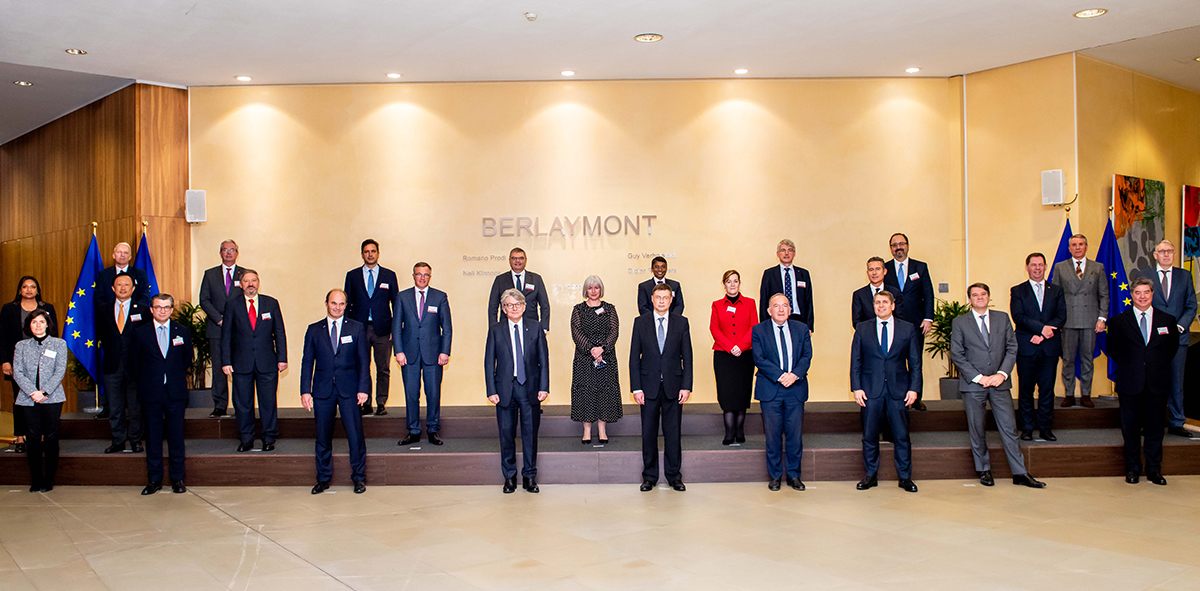
On 9 November, BusinessEurope President Pierre Gattaz, Director General Markus J. Beyrer and 23 business leaders from our Advisory and Support Group met with EU representatives at the Berlaymont building (headquarters of the European Commission) in Brussels. They exchanged views with Vice-President Dombrovskis, European Commissioners Mairead McGuinness, Kadri Simson and Thierry Breton and the Head of Cabinet of Vice-President Frans Timmermans, Diederik Samsom. Together they tackled a wide range of issues, including sustainable finance, the fit-for-55 package, current trade issues, the European Chips Act, the European Recovery Plan and the current energy price hikes.
Contact: Nathan Munch
Photo copyright: Europe by Satellite (EbS)
Emma Marcegaglia talks about B20 recommendations
Watch the highlights of our online event “Morning Talks on International Issues” with B20 Italy chair Emma Marcegaglia. The next edition will take place on 17 November with former European Commissioner for Trade Cecilia Malmström as a guest. You can register here.
New publication: Economic Outlook Autumn 2021
Strong economic recovery, but responsible wage developments required to keep it on track
 “The EU economy is undergoing a strong recovery, but our exports and production are increasingly suppressed by growing strains and bottlenecks in global supply chains, as well as surging energy prices, which threatens to blunt the upturn”, said BusinessEurope Director General Markus J. Beyrer at the release of our Autumn 2021 Economic Outlook on 8 November. “While the upturn gives reason for some optimism, wage moderation will be important in ensuring that temporary price rises do not lead to a damaging wage-price spiral, which would risk Europe’s global competitiveness and cause permanently higher inflation”, he stressed. Reflecting on these developments, BusinessEurope forecasts economic growth in the EU27 of 4.8% this year, followed by 4.3% next year. Read our full forecast and policy recommendations.
“The EU economy is undergoing a strong recovery, but our exports and production are increasingly suppressed by growing strains and bottlenecks in global supply chains, as well as surging energy prices, which threatens to blunt the upturn”, said BusinessEurope Director General Markus J. Beyrer at the release of our Autumn 2021 Economic Outlook on 8 November. “While the upturn gives reason for some optimism, wage moderation will be important in ensuring that temporary price rises do not lead to a damaging wage-price spiral, which would risk Europe’s global competitiveness and cause permanently higher inflation”, he stressed. Reflecting on these developments, BusinessEurope forecasts economic growth in the EU27 of 4.8% this year, followed by 4.3% next year. Read our full forecast and policy recommendations.
![]() Contact: Malthe Munkøe
Contact: Malthe Munkøe
European business wants an effective WTO
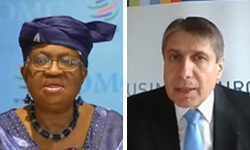 “European business is committed to supporting a strong and effective World Trade Organisation (WTO), as a cornerstone of the global trading system. With the 12th Ministerial Conference taking place in less than a month, it is important that all WTO members show pragmatism and a result-driven approach to achieve a successful outcome. A successful 12th WTO Ministerial is needed to rebuild trust in the multilateral trading system”, said Markus J. Beyrer, Director General of BusinessEurope in a meeting between WTO Director General Ngozi Okonjo-Iweala and BusinessEurope members. BusinessEurope expects that the WTO Ministerial will lead to progress in adjusting the rules to the needs of the 21st century, for instance in digital economy, industrial subsidies and sustainability. “Businesses want modern rules that cover all areas related to trade, from the more traditional trade in goods and services, to areas such as digital trade”, Beyrer stated. These rules, he added, should ensure a level playing field by promoting, for instance, a competitive neutrality agenda, tackling industrial subsidies, export restrictions and forced technology transfers. “But rules must also be enforced and we urgently need a functioning dispute settlement system“, Beyrer concluded.
“European business is committed to supporting a strong and effective World Trade Organisation (WTO), as a cornerstone of the global trading system. With the 12th Ministerial Conference taking place in less than a month, it is important that all WTO members show pragmatism and a result-driven approach to achieve a successful outcome. A successful 12th WTO Ministerial is needed to rebuild trust in the multilateral trading system”, said Markus J. Beyrer, Director General of BusinessEurope in a meeting between WTO Director General Ngozi Okonjo-Iweala and BusinessEurope members. BusinessEurope expects that the WTO Ministerial will lead to progress in adjusting the rules to the needs of the 21st century, for instance in digital economy, industrial subsidies and sustainability. “Businesses want modern rules that cover all areas related to trade, from the more traditional trade in goods and services, to areas such as digital trade”, Beyrer stated. These rules, he added, should ensure a level playing field by promoting, for instance, a competitive neutrality agenda, tackling industrial subsidies, export restrictions and forced technology transfers. “But rules must also be enforced and we urgently need a functioning dispute settlement system“, Beyrer concluded.
Contact: Sofia Bournou
Macroeconomic Dialogue: need for moderation in response to price pressures
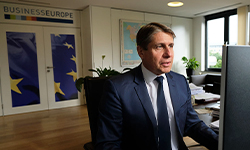 Wage moderation will be important to avoid that the temporary price rises we are seeing erode competitiveness and set off a damaging wage-price spiral. That was the key message that BusinessEurope Director General Markus J. Beyrer delivered at the Macroeconomic Dialogue, which drew together on 8 November Social Partners and European Institutions. The President of the European Central Bank Christine Lagarde, and the European Commission Executive Vice-President Valdis Dombrovskis, also participated in the exchange about developments and challenges facing the European economy. “Whilst our economy is experiencing a solid upturn, bottlenecks and supply chain disruptions, as well as surging energy prices, now threaten to weaken growth and are generating strong upward inflationary pressures, which in turn puts upward pressure on wage demands”, Beyrer highlighted during the event.
Wage moderation will be important to avoid that the temporary price rises we are seeing erode competitiveness and set off a damaging wage-price spiral. That was the key message that BusinessEurope Director General Markus J. Beyrer delivered at the Macroeconomic Dialogue, which drew together on 8 November Social Partners and European Institutions. The President of the European Central Bank Christine Lagarde, and the European Commission Executive Vice-President Valdis Dombrovskis, also participated in the exchange about developments and challenges facing the European economy. “Whilst our economy is experiencing a solid upturn, bottlenecks and supply chain disruptions, as well as surging energy prices, now threaten to weaken growth and are generating strong upward inflationary pressures, which in turn puts upward pressure on wage demands”, Beyrer highlighted during the event.
Contact: Malthe Munkøe
Trade, digital and green transitions discussed at EU-Japan Business Roundtable
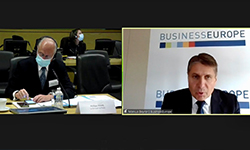 “The EU-Japan Economic Partnership Agreement is an excellent platform to discuss the challenges of industrial cooperation in green growth”, said BusinessEurope Director General Markus J. Beyrer at the 23rd EU-Japan annual Business Roundtable (BRT) on 4 November. The BRT brings the business perspective to review factors affecting trade, investment and other forms of cooperation between both sides. It also issues recommendations to the EU and Japan Authorities. This year’s meeting brought together high-level business and government representatives to discuss important issues such as digital transformation, trade, regulatory cooperation, and the green transition. US representatives were invited to the BRT for the first time and participated in a trilateral discussion on industrial cooperation on green growth. “This dialogue should also be extended to the USA as a like-minded partner. The EU, Japan and the USA should work together to promote the uptake and liberalisation of green goods, technologies and services, including at WTO level”, Beyrer stated. He added that if we manage trilaterally (EU-Japan-USA) to set important standards like on green technologies, other partners will follow and we will lead the way on setting global standards.
“The EU-Japan Economic Partnership Agreement is an excellent platform to discuss the challenges of industrial cooperation in green growth”, said BusinessEurope Director General Markus J. Beyrer at the 23rd EU-Japan annual Business Roundtable (BRT) on 4 November. The BRT brings the business perspective to review factors affecting trade, investment and other forms of cooperation between both sides. It also issues recommendations to the EU and Japan Authorities. This year’s meeting brought together high-level business and government representatives to discuss important issues such as digital transformation, trade, regulatory cooperation, and the green transition. US representatives were invited to the BRT for the first time and participated in a trilateral discussion on industrial cooperation on green growth. “This dialogue should also be extended to the USA as a like-minded partner. The EU, Japan and the USA should work together to promote the uptake and liberalisation of green goods, technologies and services, including at WTO level”, Beyrer stated. He added that if we manage trilaterally (EU-Japan-USA) to set important standards like on green technologies, other partners will follow and we will lead the way on setting global standards.
Contact: Elena Suárez
COP26 side event highlights the role of business in the climate transition
 With businesses at the centre of the climate transition – what are the remaining barriers and what are the key tools to overcome them? These questions were at the heart of a side event co-organised by BusinessEurope, CEN-CENELEC and Eurochambres in the framework of the European Commission’s pavilion at the Glasgow climate conference on Saturday, 8 November. With the event livestreamed to Glasgow and broadcast online from the Commission’s Brussels COP-studio, speakers where directly involved in the global debate. The event was opened by three short keynotes, pointing out the importance of local business action, standards, and innovative technologies such as Carbon Capture and Storage (CCS). “We have seen an unprecedented demand for our CCS solutions”, stressed Torbjørg Fossum, Vice President for CCS at Equinor. The following panel discussion highlighted the most important areas of action: “We have to enable the provision of emission free energy at affordable prices around the world, foster innovation and invest in infrastructure”, summarised Nick Bitsios, Chair of BusinessEurope’s Energy and Climate Working Group, who had just arrived from Glasgow. The panel also brought together insights from Philips, the European Commission’s Directorate-General for Internal Market, Industry, Entrepreneurship and SMEs (DG GROW) and the German Chamber of Industry and Commerce (DIHK). A recording of the event is available here.
With businesses at the centre of the climate transition – what are the remaining barriers and what are the key tools to overcome them? These questions were at the heart of a side event co-organised by BusinessEurope, CEN-CENELEC and Eurochambres in the framework of the European Commission’s pavilion at the Glasgow climate conference on Saturday, 8 November. With the event livestreamed to Glasgow and broadcast online from the Commission’s Brussels COP-studio, speakers where directly involved in the global debate. The event was opened by three short keynotes, pointing out the importance of local business action, standards, and innovative technologies such as Carbon Capture and Storage (CCS). “We have seen an unprecedented demand for our CCS solutions”, stressed Torbjørg Fossum, Vice President for CCS at Equinor. The following panel discussion highlighted the most important areas of action: “We have to enable the provision of emission free energy at affordable prices around the world, foster innovation and invest in infrastructure”, summarised Nick Bitsios, Chair of BusinessEurope’s Energy and Climate Working Group, who had just arrived from Glasgow. The panel also brought together insights from Philips, the European Commission’s Directorate-General for Internal Market, Industry, Entrepreneurship and SMEs (DG GROW) and the German Chamber of Industry and Commerce (DIHK). A recording of the event is available here.
Contact: Steffen Engling
European Labour Authority: new helpdesk crucial to support mobile companies and workers
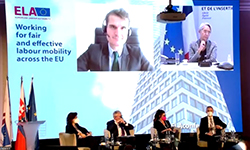 Worker mobility is important for companies both at EU level and within national boundaries to access a wider pool of qualified workers. In a situation of growing labour shortages, such as in the ongoing recovery from the Covid crisis, the role of labour mobility is particularly important to promote a better match between jobs and skills across Europe. In this context, the European Labour Authority (ELA) has an important role to create a helpdesk supporting mobile companies and workers with practical, clear and coherent guidance on applicable EU law. On top of this, the European Commission should play its role as guardian of the EU Treaty to address responsibly the situations where the national posting rules undermine the EU Single Market. The business community deplores in particular the fragmented and far-reaching national transposition rules that came under the 2014 enforcement directive on posting of workers. This complex legal environment creates unacceptable administrative burdens and risks on posting companies who have a hard time complying with the heterogeneous legal landscape across Europe. Moving forward, the main challenge is to create better conditions for an appropriate functioning of the Single Market when it comes to posting of workers in the context of service provision. These were the key messages from Maxime Cerutti, Director for Social Affairs, at the opening conference of the European Labour Authority which was held on 9 November in Bratislava in a hybrid format.
Worker mobility is important for companies both at EU level and within national boundaries to access a wider pool of qualified workers. In a situation of growing labour shortages, such as in the ongoing recovery from the Covid crisis, the role of labour mobility is particularly important to promote a better match between jobs and skills across Europe. In this context, the European Labour Authority (ELA) has an important role to create a helpdesk supporting mobile companies and workers with practical, clear and coherent guidance on applicable EU law. On top of this, the European Commission should play its role as guardian of the EU Treaty to address responsibly the situations where the national posting rules undermine the EU Single Market. The business community deplores in particular the fragmented and far-reaching national transposition rules that came under the 2014 enforcement directive on posting of workers. This complex legal environment creates unacceptable administrative burdens and risks on posting companies who have a hard time complying with the heterogeneous legal landscape across Europe. Moving forward, the main challenge is to create better conditions for an appropriate functioning of the Single Market when it comes to posting of workers in the context of service provision. These were the key messages from Maxime Cerutti, Director for Social Affairs, at the opening conference of the European Labour Authority which was held on 9 November in Bratislava in a hybrid format.
Contact: Robert Plummer
The role of corporate governance in innovation and competition
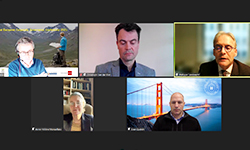 Corporate governance has a role to play in nudging companies and their boards to think more sustainably. There are best practices in this direction ranging from good and diverse board composition, transparency and good communication within the board and integration of a stakeholder-oriented perspective. Many of these are being promoted by national codes of corporate governance. Whatever approach to take it is important to acknowledge that there is no single governance model in Europe (e.g.one tier or two tier boards, Mitsbestimmung). Future EU measures on corporate governance should not amper the ability of boards to be creative, entrepreneurial or bind them to mostly compliance functions. There is a careful balance to be made in the EU if it wants to create and breed innovative companies that can compete on the world stage. We need to aim for a system that enables companies to be sustainable, not one that mistrusts their ability to make this transition. These messages were raised by Philippe Lambrecht, Chair of BusinessEurope’s Legal Affairs Committee during the European Corporate Governance Conference on 9 November, partnered by BusinessEurope.
Corporate governance has a role to play in nudging companies and their boards to think more sustainably. There are best practices in this direction ranging from good and diverse board composition, transparency and good communication within the board and integration of a stakeholder-oriented perspective. Many of these are being promoted by national codes of corporate governance. Whatever approach to take it is important to acknowledge that there is no single governance model in Europe (e.g.one tier or two tier boards, Mitsbestimmung). Future EU measures on corporate governance should not amper the ability of boards to be creative, entrepreneurial or bind them to mostly compliance functions. There is a careful balance to be made in the EU if it wants to create and breed innovative companies that can compete on the world stage. We need to aim for a system that enables companies to be sustainable, not one that mistrusts their ability to make this transition. These messages were raised by Philippe Lambrecht, Chair of BusinessEurope’s Legal Affairs Committee during the European Corporate Governance Conference on 9 November, partnered by BusinessEurope.
Contact: Pedro Oliveira
How to address disruptions in global supply chains
 “Unlike short-term challenges, which are in principle temporary and directly linked to the Covid outbreak, medium to long-term challenges have deeper root causes and were a reality already before the pandemic”, said BusinessEurope Deputy Director Eleonora Catella at the Trade Policy Day "EU Trade Policy in a Changing World", organised by the Committee on International Trade of the European Parliament on 9 November. Catella pointed out that export restrictions, localisation requirements, measures that merge security, foreign and economic policy objectives and fragmentation of standards and regulations are trends that will pose a threat in terms of protectionism and fragmentation of global value chains if not addressed. “Companies are putting in place several strategies to address these challenges, like diversifying suppliers, increasing stocks, improving lead times and supply chain transparency, to be able to plan better for future crisis. However, certain areas are independent from companies and require public action”, she added. These elements came out in a recent survey conducted by BusinessEurope.
“Unlike short-term challenges, which are in principle temporary and directly linked to the Covid outbreak, medium to long-term challenges have deeper root causes and were a reality already before the pandemic”, said BusinessEurope Deputy Director Eleonora Catella at the Trade Policy Day "EU Trade Policy in a Changing World", organised by the Committee on International Trade of the European Parliament on 9 November. Catella pointed out that export restrictions, localisation requirements, measures that merge security, foreign and economic policy objectives and fragmentation of standards and regulations are trends that will pose a threat in terms of protectionism and fragmentation of global value chains if not addressed. “Companies are putting in place several strategies to address these challenges, like diversifying suppliers, increasing stocks, improving lead times and supply chain transparency, to be able to plan better for future crisis. However, certain areas are independent from companies and require public action”, she added. These elements came out in a recent survey conducted by BusinessEurope.
Contact: Eleonora Catella
Economic growth remains a key concern but cannot stand alone
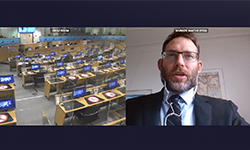 GDP remains a crucial statistical indicator and economic growth remains a key concern. However, we must not forget that economic progress is not an end in itself, but rather a means to an end that allows us to mobilise additional economic resources to help us, for example, to invest in improving societal well-being or transition towards a low-carbon economy. That was the key message from BusinessEurope Senior Advisor Malthe Munkøe at the European Economic and Social Committee seminar on “Going Beyond GDP” on 3 November. The event facilitated exchanges with experts and the social partners about the appropriateness of various statistical indicators in public debate. Munkøe stressed that rather than abandoning the focus on economic activity and GDP, we must find ways to reconcile the need to obtain higher growth, especially in the context of recovering from the devastating pandemic and combating climate change.
GDP remains a crucial statistical indicator and economic growth remains a key concern. However, we must not forget that economic progress is not an end in itself, but rather a means to an end that allows us to mobilise additional economic resources to help us, for example, to invest in improving societal well-being or transition towards a low-carbon economy. That was the key message from BusinessEurope Senior Advisor Malthe Munkøe at the European Economic and Social Committee seminar on “Going Beyond GDP” on 3 November. The event facilitated exchanges with experts and the social partners about the appropriateness of various statistical indicators in public debate. Munkøe stressed that rather than abandoning the focus on economic activity and GDP, we must find ways to reconcile the need to obtain higher growth, especially in the context of recovering from the devastating pandemic and combating climate change.
Contact: Malthe Munkøe
Trade and Sustainable Development chapters are a key tool of EU trade policy
 On 29 October, BusinessEurope submitted its contribution to the European Commission online public consultation regarding the review of the current EU approach to Trade and Sustainable Development (TSD) in EU trade agreements. The consultation is part of the ongoing review of the so-called EU 15-Point Action Plan. This plan was published in February 2018 and has since guided the improvement of the implementation and enforcement of the TSD chapters in EU free trade agreements. The review covers all relevant aspects of TSD implementation and enforcement, including the scope of commitments, monitoring mechanisms, the possibility of sanctions for non-compliance as well as the institutional set-up and resources required. BusinessEurope believes that TSD chapters are an essential instrument of EU trade policy on sustainability. They contribute to a level playing field through binding commitments on labour, environmental, social, and human rights and they promote deep cooperation among Parties and members of civil society, incentivising compliance with international conventions and stepping up domestic engagement. Furthermore, they attribute a formal role to civil society organisations in the monitoring of these provisions, thereby empowering them vis-à-vis their governments. While the EU needs to make a more assertive use of the existing mechanisms under the agreements to ensure the compliance of partner countries with TSD provisions, BusinessEurope does not believe that an approach based on sanctions would address the core problems and lead to concrete improvements on the ground. Rather, a dialogue-based approach complemented with targeted technical assistance and capacity building measures is best suited to achieve improvements in this area.
On 29 October, BusinessEurope submitted its contribution to the European Commission online public consultation regarding the review of the current EU approach to Trade and Sustainable Development (TSD) in EU trade agreements. The consultation is part of the ongoing review of the so-called EU 15-Point Action Plan. This plan was published in February 2018 and has since guided the improvement of the implementation and enforcement of the TSD chapters in EU free trade agreements. The review covers all relevant aspects of TSD implementation and enforcement, including the scope of commitments, monitoring mechanisms, the possibility of sanctions for non-compliance as well as the institutional set-up and resources required. BusinessEurope believes that TSD chapters are an essential instrument of EU trade policy on sustainability. They contribute to a level playing field through binding commitments on labour, environmental, social, and human rights and they promote deep cooperation among Parties and members of civil society, incentivising compliance with international conventions and stepping up domestic engagement. Furthermore, they attribute a formal role to civil society organisations in the monitoring of these provisions, thereby empowering them vis-à-vis their governments. While the EU needs to make a more assertive use of the existing mechanisms under the agreements to ensure the compliance of partner countries with TSD provisions, BusinessEurope does not believe that an approach based on sanctions would address the core problems and lead to concrete improvements on the ground. Rather, a dialogue-based approach complemented with targeted technical assistance and capacity building measures is best suited to achieve improvements in this area.
![]() Contact: Eleonora Catella, Benedikt Wiedenhofer
Contact: Eleonora Catella, Benedikt Wiedenhofer
Calendar 
- 15-17 November: SME Assembly 2021
- 17 November: Morning Talks on International Issues No.2
- 17-18 November: European Business Summit 2021
- 22-25 November: CONCORDi 2021- Industrial innovation for competitive sustainability
- 1 December: Reinventing Greece through Investments in Innovation
Not yet a subscriber? Register here.
Reminder: please have a look at our privacy policy